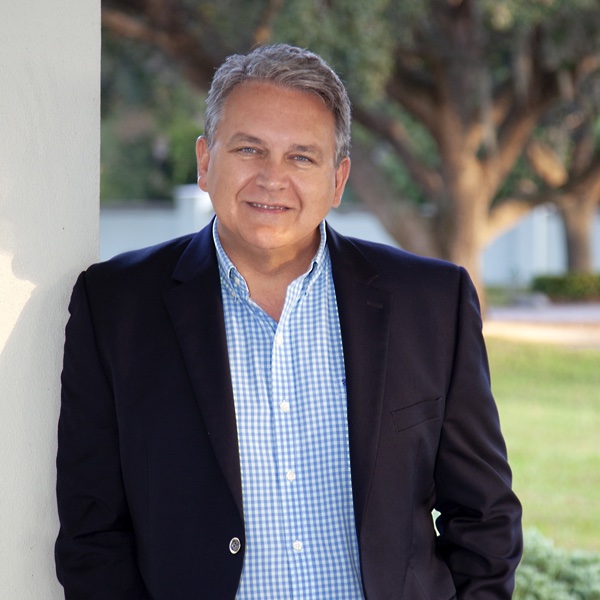College of Christian Studies-Clamp Divinity School
Florida pastor appreciates Clamp Divinity faculty’s biblical, practical approach to ministry training
Three decades of ministry has taken Dr. Timothy Mann to Missouri, his home state of North Carolina, and now the Florida coast. He feels that the Clamp Divinity School faculty members understand what it is to serve a church congregation first-hand; because of that they offer a solid, practical, biblical foundation for preparing church leaders today and tomorrow. Dr. Mann continues to give back to AU, serving in a leadership role for the newly-formed Clamp Divinity School Alumni Association as vice president.

Dr. Timothy Mann
Tell us about your calling into ministry.
I was in the United States Army at the time. My wife and our kids were involved in a local church off the military post. During that time period in the late 1980s, really by 1989, God began to put a burden on my heart as it related to possibly being a preacher. I didn’t really know all that entailed at the time and I really had no interest in being a pastor. That wasn’t what I originally felt like I was being called for.
I was just doing a personal Bible reading in Isaiah 6 and of course Isaiah sees this vision of the Lord and realizes his own condition and the Almighty says “Who will go for us? Who shall I send?” And of course Isaiah said “Here I am, send me.” And it really seemed to me at that time that the Holy Spirit said to me in my heart “that’s the response I want from you: ‘Here am I, send me.’”
I didn’t really know what that meant for sure, but I told my pastor I thought maybe I was being called to preach. He said “Well, the only way I know to begin to vet that process is to let you preach.” And so a few weeks after that I ended up preaching my first message on a Sunday night in Missouri. That was in a church outside the Army post in Missouri.
And the Lord just allowed me to have some years where I, as a layman, had opportunities to fill in as a preacher and gain some experience that way. Then as God would have it, in 1993, as He orchestrated things, a local Southern Baptist church in southwest Missouri—it was a small, rural church—actually called me to be their pastor. I didn’t really have any theological training at the time other than just my own self study—being taught in church and my own zeal to preach God’s Word. I actually got out of the Army ultimately to pastor a small Baptist church in southwest Missouri. It was while I was at that church that I started attending Southwest Baptist University in Bolivar, Missouri—that’s a Missouri Baptist Convention school much like Anderson is in South Carolina. I did my bachelor’s work there. I was at that church in Missouri for six years. Then I moved back to North Carolina where I was from, originally—not my hometown but about an hour and a half from my hometown. I pastored a church there for eight years. While there I finished up some M.Div. work with Luther Rice Seminary in Atlanta. I had completed that right when I moved to Florida in 2006.
How did you discover Clamp Divinity School at Anderson University?
I was at Providence church at the end of 2011. I began doing research on a program to pursue a doctorate. I wanted it to be in the Southeast because my family is in North Carolina and I wanted to be able to visit them from time to time. I just started doing some research and discovered that Anderson University had a brand new divinity school. Dr. Michael Duduit had only been there a couple of years in really getting the College of Christian Studies going well, and they were just launching the Doctor of Ministry program, and I think they were launching a Master of Ministry program at the same time.
I was actually in the inaugural group for the Doctor of Ministry program in the spring of 2012. The reason I chose that program was because it was a Doctor of Ministry in Biblical Preaching. I was interested in that and I knew that he had been at Union University with David Dockery, I believe. I knew some of what the program was going to be was fashioned after their D.Min. in expository preaching. Not completely, it didn’t mirror it but it was similar.
And so I called and talked to him. We chatted, I applied and then I was in that very first national conference on preaching in 2012 as the program was launching. So blessed to be part of that and be exposed to, maybe not some of the routine kinds of things that are in some D.Min. programs—(Dr. Duduit) He's quite the innovator. I was really blessed to get to have the experience and meet some of these men, even from various denominational backgrounds. They were not just Baptist guys involved in the program, which was a neat thing too.
What were some of the most meaningful experiences you brought from your program at Clamp Divinity School?
I finished the coursework at the end of 2015 and then I finally graduated in 2017. They changed things after our initial group went through. We were kind of the guinea pig group. With that first group, they didn’t let us start our dissertation until we finished all of the coursework. Now they’ve changed that, I understand, and they start their dissertation right away and they do it all the way through the coursework.
In March of next year I’ll complete 30 years of being a pastor of a church, and so it’s meaningful to me and I have respect for professors who have been practitioners. At the time, all the guys who were teaching had all been pastors, and so they understood not just the theoretical perspective or academic perspective, but they knew what it was like to be in the trenches. They knew what it was like to preach week to week before a congregation and to lead a church and to deal with everything a pastor deals with. And so that really was very meaningful to me, because that meant it was very practical for them. They understood from a practical level what it was like to be in my shoes, and that came across in how they talked, how they helped us, how they were an encouragement to us. And they thought through that filter, that lens of what it’s like to be a pastor and preach week after week and have other responsibilities.
So the practical side of it, of course, was very meaningful. The other part is that it is solidly biblical. I didn’t have to worry about whether there was going to be strange theology or doctrine. Of course Anderson being a South Carolina Baptist Convention affiliated school, I knew that there would be the guidance of the Baptist Faith and Message.
I’m grateful for that. It was very conservative theologically and very biblical, but the practical side was most helpful. A lot of writing, being stretched of course with the historical aspect of preaching, historical foundations of preaching, and then of course being encouraged to do something that’s really going to make a difference in the life of your church—again in a practical way. Even though it was a professional doctorate that I completed there, it had a significant research component to it. It felt almost like a Ph.D. It was so research-heavy at the time. My dissertation specifically was on how expository preaching can actually change the doctrinal and biblical competency of a church congregation. So I measured that and was able to see the doctrinal understanding of the church increase in a particular area, based on preaching through passages expositionally, instead of just doing topical preaching.
Tell me about Providence Church.
We started with 35 people in June 2010 and 12 years later we have a little over 400. It’s a church that loves God’s Word, loves people and really wants to be gospel-driven—I know that’s a popular theme these days—but really centered on the gospel and upholding the glory of God through it all. And they’re very warm and friendly, and they support missions. They’re not only supportive as part of the Florida Baptist Convention, but also we—in addition to that—also have a number of individual missionaries we support directly. They’re engaged in the community locally through various ministries and partnering with other works here in our community.
So I would say they are a group of Jesus followers who believe God’s Word, want to follow God’s Word, and want to reach other people with the gospel. You would receive a very warm welcome when you come, and I believe, because of the kind of church it is, and the freedom of the spirit as well, I think not only would you receive a warm welcome but you would also experience the presence of God in our church service as well.
I’ve been blessed to pastor four churches over the course of my ministry career now. I have to say that Providence Church has been really the joy of my life in so many ways. We were just blessed this past spring to plant a church about 25 miles from us, and we commissioned about 55 of our members to go be the core group of this church. So they launched in July and they’re doing well, and God is blessing and seeing people reached already, even in the few short months that church has been in existence. I understand they’re already averaging about 115. It’s in Port Orange.
What are some of the challenges you face doing ministry in your area?
Culturally it is not the Bible Belt. When you get below Jacksonville, things begin to change. Jacksonville and the panhandle all across northern Florida very much has the south Georgia, south Alabama feel. Even St. Augustine, you begin to enter into much more of a secular worldly kind of mindset. And of course we have a lot of folks that move here from other places. So there’s a wide variety of religious or non religious backgrounds, so you can’t expect folks to have the same sort of foundation that you would maybe there in Anderson, South Carolina—even an awareness of the Bible per se. It’s a transient area.
Honestly, folks move here, and want to stay sometimes four years, five years and then move away. They came and did their dream thing of living at the beach and then they all moved back home or somewhere else. It’s more of what I would consider a secular transient kind of community, and so we have to reach people while we can and we also want to disciple them as robustly as we can. So we don’t have multiple generations of the family in the church because of that. It’s not that stable kind of community like it is in the Upstate of South Carolina or Western North Carolina, and I know it’s changing some up there too even, but it’s very different here.
And because of our area—Ormond Beach—it’s just north of Daytona Beach—our area is an event driven area. We just finished up Biketoberfest, which is the smaller version of the 10-day Bike Week that happens during the spring. And then of course, spring break. We have two major NASCAR car races a year, along with other events that take place at our international speedway. And then a lot of conventions come to town. We have national cheerleading finals here, there’s a lot of tourists all the time. So it is not unusual to have repeat tourists who come every year and are in church with us on those Sundays that they’re here. We’ve had repeat folks over the last 10 years who just come down for two weekends in a year. We also have some snowbirds, as they’re affectionately known, who live down here in the winter. We had some of our snowbirds back Sunday morning in our church services. They live down here in the winter and they live back up in the mountains or somewhere else in the summer.
How were you impacted by Hurricane Ian coming into your area? How did you respond to the needs surrounding you?
It sat here over us for a full day as a hurricane and a tropical storm.
We were able to collect a number of goods—food and water actually for the utility workers that came in to help us. We had a lot of folks come in. One of the major problems we dealt with was of course power being out for up to a week in some areas, and so we wanted to be a blessing to those who came in—not only our Florida Power and Light guys, but also the ones who came in from out of state. We had an effort to be a blessing to those folks. We also had a number of people who were able to help other church members who experienced some flooding and some house damage.
Then we’ve also given an offering to the disaster relief that goes to the Florida Baptist Convention. Again we’re blessed on our side here, because we don’t have as many long term issues that the southwestern portions of the state is dealing with. There has been some loss and that’s difficult for folks to deal with as far as being displaced from their house. We have church members who it will be a few months before they’re back in their house. They have adult kids in the area and are able to stay with them right now. We just help each other and help other churches. We had a local church in the area that didn’t think they were going to be able to have their facilities open and needed to have a funeral. We offered our facility for them to host that funeral here, so that was a blessing that we were able to do that.
This is probably our fourth hurricane we’ve gone through since we’ve been here. It’s what you’re ready to do. You know what’s going to happen. After you’ve been through a few you know the routine, so you’re ready with the bottled water and propane and whatever else folks might need to be able to get through the few days that it’s necessary, and you get ready to help each other for cleanup and any kind of tearout that’s necessary. We’re blessed to not have any major damage in our church family. We didn’t have any injuries or loss of life.
What would you say to another minister about why they should consider Clamp Divinity School?
I would say a couple of things.
One is, I’ve already done that because we had our student pastor, Jesse Herbrook, finish his bachelor’s degree there through the College of Christian Studies. Then also my former associate pastor had also gone through the doctorate program and he graduated, I think, in 2020. I have no problem recommending Anderson University’s College of Christian Studies or the Clamp Divinity School to anyone.
I would say—number one—you’re going to get personal attention. You’re not just going to be a number. You’re going to actually be able to interact with professors and have those relationships that will help you as you do coursework. You will also be confident in getting a solidly biblical education, and it’s going to be practical. It’s something you’re actually going to be able to use and not just theoretically have this education. You’re really going to be able to put it to use in your ministry setting. It will help you, it will grow you, you’ll be stretched and developed to be better equipped, to serve God’s people and to reach a world that needs to hear the gospel.
What gives you a sense of accomplishment at the end of the day?
Well, for me, it’s really the stories about people. We can point to numbers and growth and facilities and these types of things, but for me it’s knowing the stories of people’s lives, about how the gospel has changed them and they’ve been devoted to following Jesus, wanting to grow and reach other people, and disciple other folks. When I take time to reflect on the life of this church right now, people whose lives are being changed and I see it, that’s what gives me a great sense of significance, is that I got to be a little part of that. God does the work, obviously, but He uses people. To think God has allowed me to have a small part in their development as a follower of Jesus Christ, that really is what gives me a sense of joy and a sense of significance. It’s not that I’m some big preacher, it’s not that I can lead a meeting or cast a vision to raise a lot of money. It’s really about life change. When you can see that in people’s lives, that is really what gives me a great sense of accomplishment.




